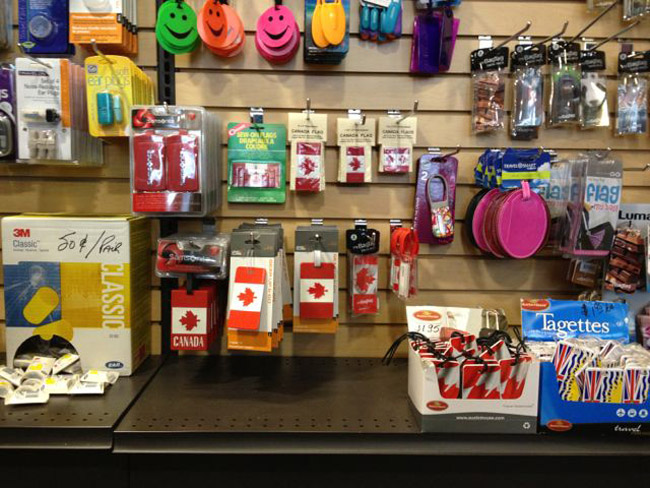 This shop display shows maple leaf flags to be sewn onto backpacks. JACKIE HOFFART PHOTO カナダ人は海外旅行に行く際、バックパックにメープルリーフの国旗を付け、自分がカナダ人であることをアピールするというステレオタイプがあります。しかし、ジャッキーは交換留学経験をきっかけに国旗を付けなくなったそうです。
I love Canada, but I stopped being proud to be a Canadian when I was 17. I wasn't embarrassed or ashamed to be a Canadian. I just started to think critically about national pride, nationalism and one's responsibility for one's culture in a global context.
You see, when I was a teenager, I participated in a reciprocal exchange program: An exchange student from Germany came to our house in Canada for three months, and later, I spent three months in her home in Germany.
Those were probably the most influential 100 days of my life. For one thing, I learned a ton of German. But I also learned a lot about what it's like to live in a different culture.
My shift in thinking about nationalism happened one night when my exchange partner and I were up late talking in our pajamas. I mentioned that my grandfather had fought in World War II, and she said that her grandfather did too. I suddenly realized that our grandfathers were on opposite sides of that war. It was chilling to think that they would have been out to kill each other on the battleground.
It got me thinking. With the exception of its more recent egregious record on climate change, Canada enjoys popularity globally, and it's acceptable to take pride in being Canadian. Germany: Not so much. Germans, as a direct consequence of WWII and the Holocaust, specifically, do not enjoy the same privilege.
So while I could claim pride in my country without giving it another thought, my German friend could not. She had no control over her country's history, but she simply could not sew her country's flag onto her backpack like I did.
Then I realized I had nothing to do with Canada's history, either. So why should I be proud of something I had nothing to do with? In fact, there is plenty to be ashamed of in Canada's history, not least of which is our history of inhumane treatment of the First Nations Peoples of Canada. It was only four years ago that Prime Minister Stephen Harper officially apologized for the assimilation polices of native residential schools.
So where did that leave me? It left me sympathetic to my German friends. It left me critical of a lot of other assumptions I had made through my education. It made me want to learn more about other cultures.
It was very interesting for me to experience first-hand how completely different the consciousness around war guilt works in Germany and Japan. In Germany, I would argue, they teach students about the war much more thoroughly and from different perspectives than in the Canadian or Japanese education system, thus producing people who are, I think, generally more critical of their history. I actually think that's something Germans should be very proud of.
The experience of living abroad taught me to be mindful of my cultural assumptions. I also came to appreciate how many of the things about Canada that I truly do love and am grateful for. I can say that I feel very lucky and happy to be Canadian, but to say I feel "proud" makes it feel like I had something to do with it. And I didn't. If I had immigrated here, then perhaps I could say I was proud, because I would have had some agency over that choice. But I didn't. I was simply born here and thus I am Canadian.
Watching the American elections and all of their jibber-jabber about the U.S. being the best country on Earth made me a little queasy. Americans might be the best in the world at marketing, which is why they sell (and buy) this "America is best" story, despite the dismal state of their health-care system, economy and welfare. But I'm no America-hater. I think there's a lot of cool stuff going on in the States, just like there's a lot of cool stuff happening in a lot of countries all over the world.
When people start to talk about their country being the best, I get a little . . . nervous. It's that sort of thing that leads to jingoism and war. The truth is, I kind of like to think that my grandfather and my exchange partner's grandfather would have been pleased that, 60 years after they fought each other, their descendants were able to learn about each other's cultures, exchange ideas, hopes and stories, and giggle and laugh in their pajamas, way past their bedtime. That's my kind of world peace.
Next time: Going home over the holidays
|




